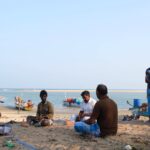One year ago, two devastating earthquakes in Turkey and Syria killed more than 55,000 people and left 3 million more homeless. In the immediate wake of the earthquakes, the Fund, which supports several grassroots groups in the region, launched an emergency campaign to help activists with strong local knowledge and networks respond to critical needs.
Thanks to the generosity of donors and the Fund’s expert team of grantmakers and program staff, we made rapid response grants and sent the $100,000 to grassroots groups straight after the earthquakes.
This funding provided immediate relief including blankets, food, tents, and medical supplies, as well as translated resources and psychological support for survivors in the days and weeks following the earthquakes. For the marginalized communities the groups we support serve, such as women, ethnic minorities (e.g. Kurdish communities), LGBTQ+ people, and migrants and Syrian and other refugees, these resources were truly lifesaving. Official relief efforts prioritized Turkish citizens and for these groups, existing biases and inequalities were intensified.
As time went on and the disaster faded from international headlines, the Fund’s support allowed groups to reassess the needs of the communities they serve, monitor for abuses, and help refugees recover ID and other critical lost documents. This work was done alongside their strategic efforts to advance gender equality and fair, humane treatment of displaced and migrating people.
As stories marking the anniversary of the earthquakes note, many survivors are still living with the disaster’s effects. The government has not yet met its commitment to rebuild homes and many plans cater to upper-class residents, leaving vulnerable people in temporary shelters or struggling to survive. One year later, the grassroots groups we support continue to fill a critical gap—helping those affected reclaim their lives and navigate the dual hurdles of discrimination and poverty.
Countering a Rise in Violence Against Women
Research conducted prior to the earthquakes found that 40 percent of women in Turkey experience violence, including sexual assault, and 3 in 10 are married before they turn 18. Women and girls, particularly those living in rural areas or in poverty, also struggle to access sexual and reproductive health services. Groups like Leader Woman Association (LWA) are vital partners in both helping women and girls build knowledge and skills to advocate for their rights and pushing for gender equality policies.
Following disasters, the risk of violence against women and girls rises. Trauma, financial insecurity, and other drivers of gender-based violence skyrocket, while support systems and healthcare services disappear. Relief efforts often add to the risk. For example, in areas like Mardin, LWA found that container cities housing thousands of people lacked privacy for showers and toilets and proper lighting at night. Refugees were moved 24 miles outside the city center, making conditions harder to monitor. As a result, LWA shifted its work to start addressing the short- and longer-term housing, health, and psychosocial needs of these women and children.
In Adıyaman, one of the worst-hit provinces in Turkey, LWA was the only women- and refugee-focused NGO. There, our support allowed them to set up a new office and expand their work to connect women and girls with general and reproductive health care, access government and other aid, hold workshops around violence prevention and legal options, and host discussions on the importance of girls’ education. Today, LWA reports that the needs of women and girls in Adıyaman and the other provinces where they work are increasing.
Supporting Migrants and Refugees Facing Discrimination
Turkey is home to the largest number of refugees in the world—5 million, including more than 3.8 million escaping war in Syria—who face rising anti-migrant sentiment and discrimination in their new country. The earthquake compounded this by destroying their homes, documents, and remaining sense of safety. Aid efforts deprioritized migrants
After the disaster, grassroots groups quickly stepped in to make sure refugees and migrants could find safety and community. The Fund’s support helped them provide emergency supplies, from blankets and hygiene kits to vouchers or cash transfers to get food. They translated information about aid and asylum registration and connected refugees who were relocated to Mardin or other cities with job opportunities and other resources.
One group, Reyhan, focused particularly on the needs of children refugees and migrants. The Fund’s support has allowed them to increase desperately needed psychological services to this community and legal counseling for youth facing barriers to returning to school. They also created a center for children and young adults offering counseling, art activities, and sports. Reyhan’s center has also become a vital hub for young refugee men, who have struggled to find housing or pay increased education fees since the earthquakes.
The incredible outpouring of support from the Fund’s community has saved lives and made a difference for thousands of people after the devastating earthquakes. As grassroots activists continue to meet earthquake survivors’ needs, they also work to further equality, justice, and opportunity for their communities. The Fund is committed to standing with all the activists we support as they respond to every challenge marginalized people face, from natural disasters to discrimination.
Houda Benmbarek is a consultant for the People on the Move Program at the Fund for Global Human Rights.


